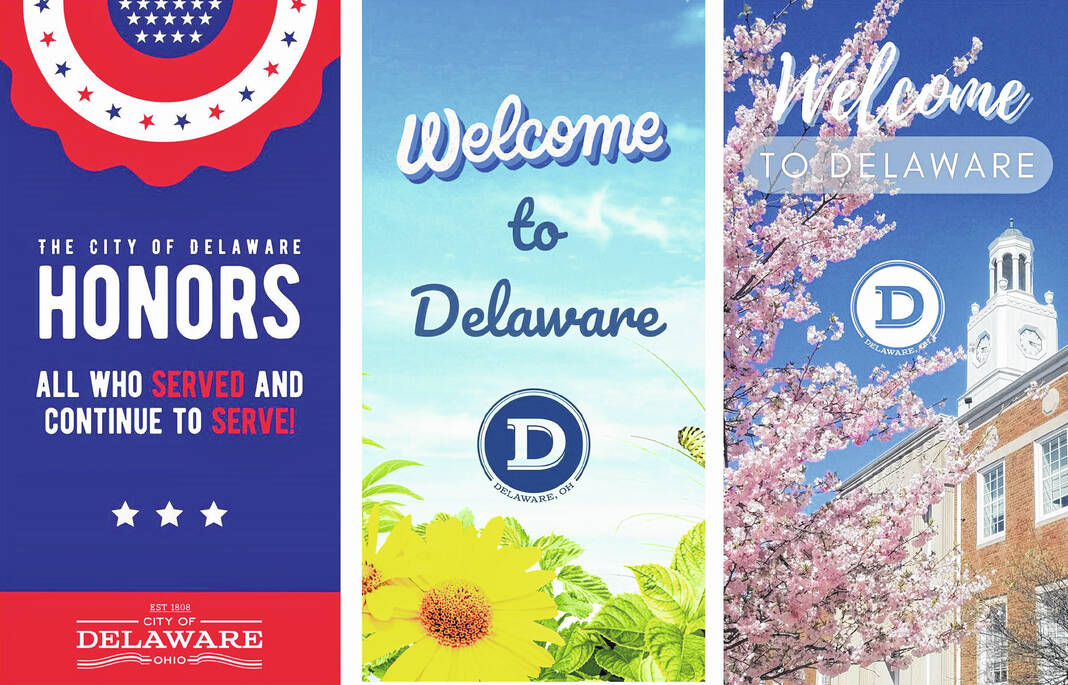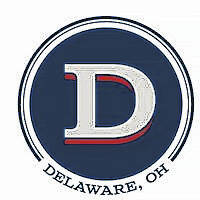
Pictured are some examples of city-themed banners created by the City of Delaware.
Courtesy | City of Delaware

Nearly a year after pausing its flag and banner policy for reassessment, Delaware City Council held a discussion during Monday’s meeting to consider proposed changes to the policy.
The policy was paused last May at the request of City Manager Tom Homan in order to further analyze the U.S. Supreme Court’s ruling on the Harold Shurtleff v. City of Boston case earlier that month. On May 2, 2022, the Supreme Court ruled the City of Boston acted in violation of the U.S. Constitution when it refused to let a local organization fly a Christian flag on one of the three flag poles sitting in front of its city hall that had long been offered to various organizations when holding ceremonies on the city hall plaza.
At the heart of the Supreme Court case was the need to differentiate between government speech and public forum. In the Supreme Court’s opinion, Justice Stephen Breyer said, “When the government encourages diverse expression — say, by creating a forum for debate — the First Amendment prevents it from discriminating against speakers based on their viewpoint.”
During the case, it was determined that the City of Boston had no written policy limiting the use of the flag pole based on the content of a flag. There were disputes over whether or not the City of Boston reserved the pole to fly flags communicating governmental messages or instead opened the pole for citizens to express their own views.
Ultimately, the Supreme Court decided the city had not reserved the pole for flags displaying governmental messages in the hundreds of approved flag submissions prior to Shurtleff’s request and had, therefore, infringed upon the Freedom of Speech Clause of the Constitution.
Breyer added, “The city’s lack of meaningful involvement in the selection of flags or the crafting of their messages leads us to classify the flag raisings as private, not government, speech — though nothing prevents Boston from changing its policies going forward.”
Speaking during Monday’s meeting, Delaware City Attorney Natalia Harris said the initial recommendations from the city following the pause centered around addressing the multiple policies that existed for different types of displays.
“We have banners, we have light poles, we have flag brackets … So the recommendation was to make one comprehensive policy, reduce that to writing, strengthen the current language around the policy relative to the amount of discretion that was inherent in the initial policy, and ensure that the city maintains control over things the Shurtleff decision pointed out….” Harris said.
Although the policy drafted by Harris is currently hidden behind attorney-client privileges, Vice Mayor Kent Shafer said he felt it was important to summarize the intent of the potential policy for the public.
“Part one indicates that we would fly, as far as flags, the United States flag, the flag of the state of Ohio, and the flag of the city of Delaware,” Shafer said. “In terms of banners, we would only fly city-themed banners that are created by the city to be displayed on city light posts. These city banners would promote city-sponsored events and the following institutional partners, which are Delaware City Schools, Olentangy Local School District, Ohio Wesleyan University, Main Street Delaware, The Little Brown Jug, Central Ohio Symphony, and Delaware-Morrow Mental Health and Recovery Services Board.”
Some council members questioned parts of the draft language and how certain aspects, such as city themes and institutional partners, are defined. Homan noted that, while the city is making its best effort to limit it, there is always going to be an element of ambiguity in the policy.
“That’s the challenge here,” he said. “This is somewhat imperfect, and it’s trying to find the least imperfect option for the city, and so that’s what we’re trying to balance.”
However, some of the suggestions by council members during the meeting seemed to only add to the potential for future disputes and contestation by groups looking to find cracks in the policy. Shafer, responding to a discussion about the ability for groups to come before council with petitions to be included in the policy, reiterated the very reason council began looking at redefining the policy.
“I thought when we first started talking about this when the (Supreme Court) decision first came out, one of our goals was to come up with a clear policy so we’re not making those kinds of decisions where we say these are the community partners that we’re going to support, these are the flags that we’re going to fly so that we’re not put in that position of saying this one is okay and that one’s not okay,” Shafer said. “That is what I thought our major intent was, and if we then add in a piece about petitions, now we’re right back to doing the same thing as before. Even though we’re saying it’s government speech, we’re still deciding which special interests we’re going to support and which special interests we’re not going to support.”
Harris concurred with Shafer’s sentiments, saying, “I agree that, in my understanding at least, as a body, you had directed and requested that we draft a policy that minimized, and I believe the word ‘eliminated’ may have even been used, discretion, which is why you have what is in front of you.”
Harris went on to say the policy can be written to incorporate some sort of petition process, although she also noted that, in her opinion, the policy would then be much harder to defend if necessary in certain scenarios.
Following council’s discussion, a public hearing was held to allow members of the public to weigh in on the policy draft. Several members participated in the hearing, and following the hearing, Harris reiterated to the public that the policy is still simply a draft. Shafer pointed out any final draft would still need to go through the typical ordinance process of three readings by council, as well as a public hearing.
Ultimately, council decided to relay the current iteration of the draft to the public to garner more widespread feedback before moving forward with a final draft to be considered for adoption.
Reach Dillon Davis at 740-413-0904. Follow him on Twitter @DillonDavis56.

